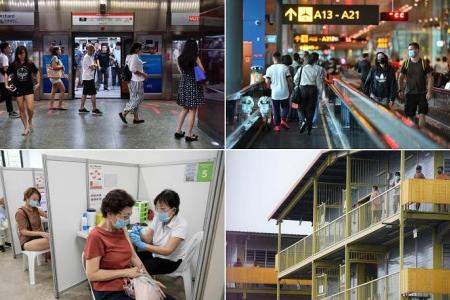6 things you need to know as S’pore moves to Dorscon green on Feb 13
From Feb 13, commuters will no longer need to wear masks when taking public transport as community regulations are progressively lifted.
This was among changes to measures the multi-ministry task force tackling Covid-19 announced on Thursday.
This comes three years after the first Covid-19 case was reported in Singapore on Jan 23, 2020.
Here are the things you need to know about the changes:
1. No masks required on public transport
From Feb 13, commuters will no longer need to wear masks when taking public transport.
However, the Health Ministry will still require visitors, staff and patients in healthcare and residential care settings to wear masks when interacting with patients. These include hospital wards, clinics and nursing homes.
Settings in these places that do not involve patient interaction are excluded. Examples of these are retail and F&B outlets, staff rest areas and car parks.
Other authorities, such as the Singapore Food Agency, for instance, may still require food handlers to wear a mask or spit guard.
Businesses may also opt to maintain mask-wearing as part of their company policy for workplace health and safety or business continuity.
Since Aug 29, 2022, masks have not been required in most indoor settings.
2. Covid-19 vaccines remain free
Covid-19 vaccinations and oral antivirals will continue to be free for those eligible.
All Singapore citizens, permanent residents, long-term pass holders and some short-term pass holders will not need to pay for vaccines under the National Vaccination Programme.
Covid-19 vaccinations and Covid-19 oral antivirals will continue to be fully subsidised for clinically eligible public hospital patients and nursing home residents until further notice.
3. Treatment and testing no longer fully subsidised from April 1
Treatment for those admitted to hospitals or Covid-19 Treatment Facilities from April 1 because of the virus will no longer be fully subsidised, regardless of their vaccination status.
People with Covid-19 will no longer need to stay in Community Isolation Facilities from April 1, just as they are not required to do so for other endemic diseases like influenza or chicken pox.
Some of these facilities will remain open for people who want to self-isolate, but they will be charged for their stay.
As these facilities are not classed as medical facilities, citizens and permanent residents will not be able to tap government subsidies, MediShield Life or MediSave to pay their bills.
All patients will be required to pay for any Covid-19 testing from April 1.
From Feb 13, protocols for those who tested positive for the virus will also be scrapped, but residents are advised to exercise social responsibility.
Persons infected with Covid-19 should follow the updated general advisory for people with acute respiratory infection symptoms.
Medical certificates issued for Covid-19 will not be differentiated from those given for other diseases, said Health Minister Ong Ye Kung.
4. TraceTogether and SafeEntry no longer required
Members of the public can uninstall their TraceTogether app, and enterprises may do the same for the SafeEntry (Business) App.
The Government will no longer require infected persons to submit TraceTogether data.
SafeEntry data is no longer being collected and the Health Ministry has deleted all identifiable TraceTogether and SafeEntry data from its servers and databases.
A TraceTogether token return exercise will take place from Feb 13 to March 12. Members of the public can return their tokens at all 108 community clubs.
5. Unvaccinated travellers entering do not need proof of pre-departure test
From Feb 13, all travellers who are not fully vaccinated and entering Singapore will no longer need to show proof of a negative pre-departure test
Short-term visitors who are not fully vaccinated will no longer have to purchase Covid-19 travel insurance.
6. Migrant workers no longer need to apply for pass to enter popular places
From Feb 13, migrant workers will be allowed to visit the community without applying for a Popular Places Pass. The pass was introduced in June 2022 to manage crowding in Chinatown, Geylang Serai, Jurong East and Little India on Sundays and public holidays.
From March 1, the Manpower Ministry will further ease the rules for migrant workers to align with those for the rest of the population.
Migrant workers living in dormitories who test positive for the virus or have mild symptoms will be able to recover in dormitories or visit a doctor.
Covid-19 tests will be administered for only vulnerable migrant workers with symptoms or those with severe acute respiratory infection symptoms.
Those with more serious symptoms such as chest pain will be taken to the emergency department of public healthcare institutions.
Get The New Paper on your phone with the free TNP app. Download from the Apple App Store or Google Play Store now

